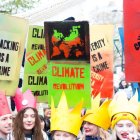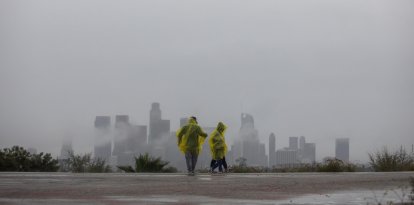The media causes ‘climate anxiety’ and harms young people with sensationalist news stories
Climate anxiety (also known as eco-anxiety) is a psychological phenomenon where people experience worry, fear or distress at the prospect of a future affected by climate change to the extent that it interferes with their enjoyment of life.

In recent years, media coverage of the climate agenda has undergone a significant change, not only in the amount of information disseminated, but also in the way it is presented. The increasing sensationalism around the environmental narrative and weather phenomena is contributing to an increase in what experts refer to as "climate anxiety," especially among young people.
Climate anxiety (also known as eco-anxiety) is a psychological phenomenon where people experience worry, fear or distress at the prospect of a future affected by so-called "climate change" to the extent that it interferes with their enjoyment of life.
59% of young people extremely worried
This type of anxiety has skyrocketed in recent years, with a particularly noticeable impact among adolescents and young adults. A Lancet survey (conducted in 2021 of 10,000 16- to 25-year-olds) found that 59% were very or extremely worried and 84% were at least moderately worried.
However, all the predictions from the climate narrative and the eventual risks to people in the future are far from reliable. It is well known that the human race is safer today, with respect to the adversities of climatic phenomena, than it was 100 years ago. The number of deaths from climate-related natural disasters has decreased by 99% since 1920.
However, despite these data, specialists dealing with climate anxiety are available in almost every major city in the nation.
Corrupted data from 96% of U.S. media outlets
There are two points to consider on the subject of climate sensationalism. According to Steve Milloy in The Wall Street Journal, "An estimated 96% of U.S. temperature stations produce corrupt data. About 92% of them have an error margin of one degree Celsius, or nearly 2 degrees Fahrenheit. The lack of accuracy of reported temperatures, whether estimated or measured, is not reassuring." Furthermore, despite talk of "global temperature," in reality, "much of the Earth's surface is not measured at all. Although the National Oceanic and Atmospheric Administration likes to present global temperatures beginning in 1880, regular collection of temperatures at places like the north and south poles began much later."
As for what this will mean for the planet if the end of the world is indeed imminent, the same official agencies can acknowledge the true reality. For example, a report by the White House Council of Economic Advisers and Office of Management and Budget on the impact of climate change on the national Gross Domestic Product concluded that the rise of 2.2°m degrees Fahrenheit has barely meant a 0.5% drop in GDP.
Finally, there remains the direct manipulation of reality to scare the population. This is something that Tony Heller has been condemning for years. Regarding the supposed recent record heat, the expert cites NASA graphs on temperature in 1999 and compares them with those published 20 years later.
‘There is no climate emergency,’ say 1609 scientists
"There is no climate emergency," reads a statement signed by 1,609 personalities from the scientific world, including two Nobel laureates, who charge against the postulates of the federal government and the global agenda.
The statement, endorsed by the Global Climate Intelligence Group (CLINTEL), does not intend to dismiss the harmful effects of polluting emissions, but it does speak of an exaggeration of some assumptions that are based on uncertainty.
"Climate science should be less political, while climate policies should be more scientific," is one of the fundamentals of this initiative headed by John F. Clauser and Ivar Giaver, both Nobel laureates in physics. The statement was made by an independent group and asserts that the public debate surrounding climate change is based on misconceptions.
Contrary to the sensationalist messages that climate change spokespeople often spout, CLINTEL asserts that there is much more nuance. According to the statement, global warming is going much slower than environmental agencies have claimed over the years. CLINTEL claims that, contrary to what government policies claim, carbon dioxide is not completely harmful. It is a source of food and resources for the earth's biomass.
They also remind, that contrary to popular belief, there is no statistical evidence that global warming is intensifying hurricanes, floods, droughts or any other natural disaster. However, measures to reduce carbon dioxide emissions continue to be increasingly costly to society.



























